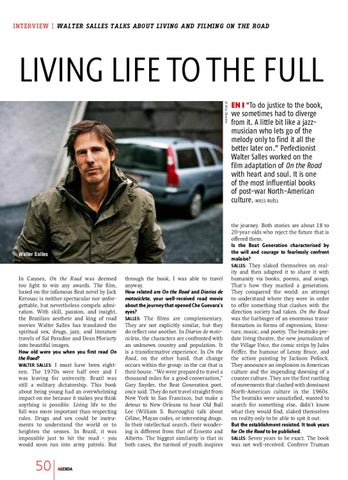interview ¦ Walter Salles talks about living and filming On the Road
Living life to the full © Kris Dewitte
Walter Salles
In Cannes, On the Road was deemed too light to win any awards. The film, based on the infamous Beat novel by Jack Kerouac is neither spectacular nor unforgettable, but nevertheless compels admiration. With skill, passion, and insight, the Brazilian aesthete and king of road movies Walter Salles has translated the spiritual sex, drugs, jazz, and literature travels of Sal Paradise and Dean Moriarty into beautiful images. How old were you when you first read On the Road? Walter Salles: I must have been eighteen. The 1970s were half over and I was leaving for university. Brazil was still a military dictatorship. This book about being young had an overwhelming impact on me because it makes you think anything is possible. Living life to the full was more important than respecting rules. Drugs and sex could be instruments to understand the world or to heighten the senses. In Brazil, it was impossible just to hit the road – you would soon run into army patrols. But
50
through the book, I was able to travel anyway. How related are On the Road and Diarios de motocicleta, your well-received road movie about the journey that opened Che Guevara’s eyes? Salles: The films are complementary. They are not explicitly similar, but they do reflect one another. In Diarios de motocicleta, the characters are confronted with an unknown country and population. It is a transformative experience. In On the Road, on the other hand, that change occurs within the group: in the car that is their house. “We were prepared to travel a thousand miles for a good conversation,” Gary Snyder, the Beat Generation poet, once said. They do not travel straight from New York to San Francisco, but make a detour to New Orleans to hear Old Bull Lee (William S. Burroughs) talk about Céline, Mayan codes, or interesting drugs. In their intellectual search, their wandering is different from that of Ernesto and Alberto. The biggest similarity is that in both cases, the turmoil of youth inspires
EN ❙ “To do justice to the book, we sometimes had to diverge from it. A little bit like a jazzmusician who lets go of the melody only to find it all the better later on.” Perfectionist Walter Salles worked on the film adaptation of On the Road with heart and soul. It is one of the most influential books of post-war North-American culture. niels ruëll the journey. Both stories are about 18 to 20-year-olds who reject the future that is offered them. Is the Beat Generation characterised by the will and courage to fearlessly confront malaise? Salles: They slaked themselves on reality and then adapted it to share it with humanity via books, poems, and songs. That’s how they marked a generation. They conquered the world: an attempt to understand where they were in order to offer something that clashes with the direction society had taken. On the Road was the harbinger of an enormous transformation in forms of expression, literature, music, and poetry. The beatniks predate living theatre, the new journalism of the Village Voice, the comic strips by Jules Feiffer, the humour of Lenny Bruce, and the action painting by Jackson Pollock. They announce an implosion in American culture and the impending dawning of a counter culture. They are the first rustling of movements that clashed with dominant North-American culture in the 1960s. The beatniks were unsatisfied, wanted to search for something else, didn’t know what they would find, slaked themselves on reality only to be able to spit it out. But the establishment resisted. It took years for On the Road to be published. Salles: Seven years to be exact. The book was not well-received. Confrere Truman
